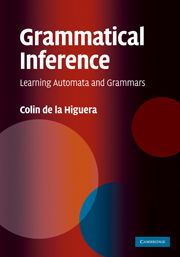Book contents
- Frontmatter
- Contents
- Preface
- Acknowledgements
- 1 Introduction
- 2 The data and some applications
- Part I The Tools
- Part II What Does Learning a Language Mean?
- 7 Identifying languages
- 8 Learning from text
- 9 Active learning
- 10 Learning distributions over strings
- Part III Learning Algorithms and Techniques
- References
- Index
7 - Identifying languages
from Part II - What Does Learning a Language Mean?
Published online by Cambridge University Press: 05 July 2014
- Frontmatter
- Contents
- Preface
- Acknowledgements
- 1 Introduction
- 2 The data and some applications
- Part I The Tools
- Part II What Does Learning a Language Mean?
- 7 Identifying languages
- 8 Learning from text
- 9 Active learning
- 10 Learning distributions over strings
- Part III Learning Algorithms and Techniques
- References
- Index
Summary
On ne sait prévoir que des répétitions et comprendre, c'est dégager le quelque chose qui se répète.
Antoine de Saint-Exupery, Carnets, 1953Namely, in interesting identification problems, a learner cannot help but make errors due to incomplete knowledge. But, using an ‘identification in the limit’ guessing rule, a learner can guarantee that he will be wrong only a finite number of times.
E. Mark Gold (Gold, 1967)Grammatical inference is concerned with learning language representations from information, which can be text, examples and counter-examples, or anything really that should provide us insight about the elements of the language being sought. If the problem can sometimes be stated in such an informal way and there are many papers presenting heuristics and ideas allowing us to extract some grammar or automaton from all types of information, theoretical properties of convergence of the algorithms are usually desired. This therefore requires more precise definitions.
Introductory discussion
Convergence is defined by not just finding some grammar but the grammar, which means considering that the problem is about searching for a hidden grammar, i.e. one defined a priori, or at least one equivalent to this ideal one. Obviously, in practice, such a hidden grammar may not exist, but the assumption is needed to study the convergence of the algorithms.
Yet, apart from very special cases, the information the learner gets is about the language generated, recognised or represented by the grammar, not about the grammar itself.
Information
- Type
- Chapter
- Information
- Grammatical InferenceLearning Automata and Grammars, pp. 143 - 172Publisher: Cambridge University PressPrint publication year: 2010
